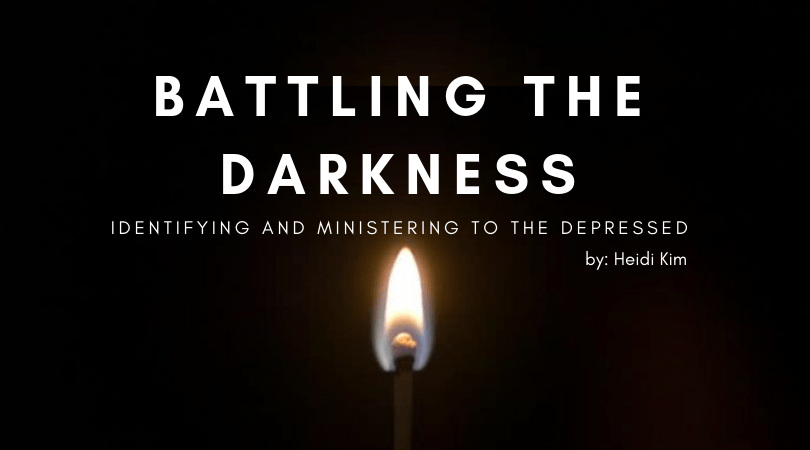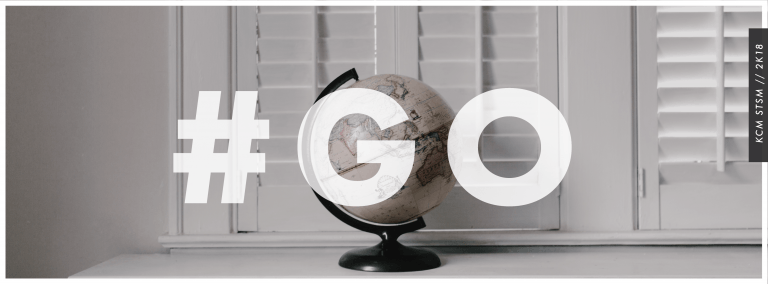Three years ago, I served as UCSD’s KCM president.
I was also severely depressed.
But, no one around me knew how to identify or minister to my depression. Even I was clueless in recognizing the signs—I simply thought I was called to endure a very difficult season of hardship.
Two years later, I was diagnosed with clinical depression, general anxiety disorder (GAD), and post-traumatic stress disorder (PTSD). It’s been almost one year since I’ve been on medication.
1 out of 5 adults suffer from a mental illness.* The prevalence of adults with a major depressive episode is highest among individuals aged 18-25 (10.9%). This could mean one person in your small group potentially has depression. To take it further, twenty individuals in a general meeting of a hundred students may be showing depressive symptoms. Do you know how to spot and help them?
Through the past few years of confusion, pain, and desperation, I say this somberly: I felt the most alone, frustrated, and misunderstood when I shared my battle with mental illness among Christians than with anyone else. The stigma, silence, and lack of knowledge in this realm is a problem more noticeable in the Church than outside of it. As a result, we are failing to minister to one-fifth of the people we know.
“I feel depressed” vs. “I am depressed”
I’m sure all of us at one point has said, “I feel depressed” or “I’m so sad.” There are many hardships that we experience throughout life that warrant this type of response. It’s a valid feeling.
Clinical depression, on the other hand, is not solely situationally-derived. It doesn’t disappear once a circumstance calms down, it is a biological result of a chemical imbalance in the brain.
Some of the common symptoms that categorize clinical depression are:
- Persistent sad, anxious, or empty mood
- Feelings of hopelessness, guilt, or worthlessness
- Higher levels of irritability
- Insomnia or oversleeping
- Lowered concentration, motivation, & energy level
- Appetite/weight-changes
- High anxiety
- Physical pain (ex. headaches, chest pain)
Although depression may look different in every individual, a mixture of these symptoms occur for over a period of two weeks to the point it debilitates daily functioning.
As I write, I feel a heavy weight on my chest that makes it uncomfortable to breathe. My body aches from a dull pain and I feel exhausted. I’ve lacked the energy to meet people or talk about what I’m feeling. The first thing I ask myself in the morning is, “Is the weight there? Is the feeling back?”
My depression wants me to stay in bed all day, but anxiety wants me to rip my skin off.
To the Observer: Listen, Don’t Fix
The main reason why I felt so isolated from Christians throughout my experience was not because they didn’t say anything—it was because they said too much.
My first piece of advice is to not make it about yourself by saying you have also felt down or by sharing your own advice. It probably took whoever is sharing with you a lot of courage to open up about his or her darkness. What he or she needs is someone to simply listen.
Most importantly, don’t share Christianese. The most infuriating things I heard were phrases such as, “Keep trusting in God. He knows what’s best for you.” Although these sayings are truths, there is a time and place where these can be shared. In moments of pain and vulnerability, Christianese minimizes the suffering someone is going through. It incorrectly makes depression a matter of faith when in reality, the issue is biological.
Lastly, affirm that he or she is heard. Validate their thoughts and pain by affirming that what they’re going through is extremely difficult. To this day, one of the most comforting phrases I hear is, “What you are feeling makes sense. Any person would feel or think the same way in this situation.”
To the Depressed: You Are Not Alone
I know what you are feeling. I understand the unspeakable pain that materializes outside of your control. I know the dreadful hopelessness that immobilizes you physically, mentally, and spiritually.
I also want you to know that therapy has changed my life. Antidepressants are slowly but surely stabilizing my mood. After over two years in therapy and a year on medication, I am still a work in progress. I don’t plan on ending either choices anytime soon.
There are options available for you. There are those who walk the same path and others who wish to walk alongside you.
To my 21-year-old self, to all the collegians who may be facing a deep, unforgiving darkness—you are not alone.





